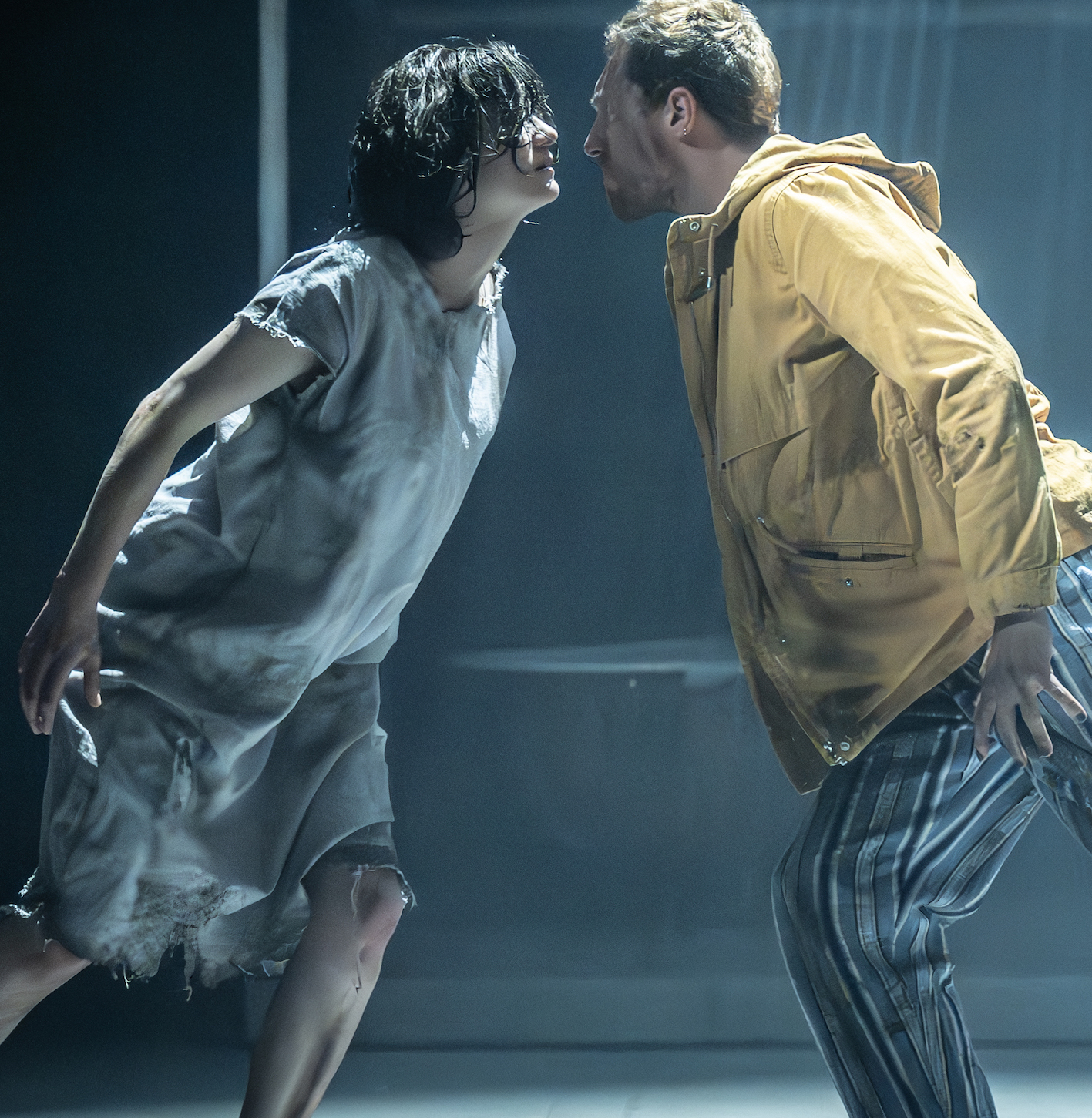John Webster’s sour, bloody tale of brotherly greed and vice has been updated by the playwright Zinnie Harris, who also directs her own text at the Trafalgar. The title has a handy [of Malfi] added. But do we really know where we are? Or which century we’re watching?
Shortening the title to The Duchess seems to indicate a more generic lead character, less anchored to a time or place. But the production wants it both ways. The action is taking place not far from Naples, according to Harris’s text, pace the original, but not in the early 16th century Italy of the original. The costuming here is resolutely contemporary. The Duchess (Jodie Whittaker) first enters, sexily, in a red cocktail number, moving over to a mike stand to deliver a song with the refrain “All because of you”. Yes, this Webster has songs, which pop up several times more, usually accompanied by a woman in white on guitar. It also has characters who talk in a 21st century demotic style, swearing liberally, while wielding tasers and making videos of mock executions. But other signs of modernity are missing: telephony of any kind, electric light switches, spectacles.
It’s as if the action is trapped in a bubble where the characters go through the motions of the original plot (though not all of them) while ruled, not by the codes of the era of their costumes and diction, but by the cruel practices of the 16th century Amalfi coast, where the real events the play is based on took place. The two eras somehow are supposed to coexist simultaneously. There are no useful clues to our location, which looks like the inside of a prison, painted pale grey and featuring a metal walkway and sliding panels with cage-like mesh in them. Only the Duchess’s opulent bed, which slides out of the back wall, looks local and moneyed.
This isn’t nitpicking about props or fashions: without some kind of recognisable context for what we are watching, it’s hard to fathom how we are supposed to react to the Duchess’s plight. A modern widow of some wealth would not allow herself to be imprisoned and brutalised by her brothers without a fight or recourse to the law, surely? Especially one as sparky as Whittaker’s, a lippy, boisterous, randy woman who shows little sign of the intellect and sweet disposition of Webster’s Duchess.
 What to make of her dastardly Cardinal brother (Paul Ready, pictured below with Jude Owusu), here seemingly a resident, not of Rome, but of the same building as the Duchess? Does Harris intend him as a symbol of the corruption of the Church today, or merely a vicious villain bent on maintaining his grip on the family money who happens to be a Cardinal? The Duchess’s secret marriage to her steward Antonio (Joel Fry) threatens to loosen that hold, but any impropriety in the liaison doesn’t seem to bother him unduly as he too busy tormenting his oddly passive mistress, Julia (Elizabeth Ayodele). Here she is married, not to Castruccio, as in the Webster, but to Delio (Hubert Burton), who is clearly more than a little in love with Antonio.
What to make of her dastardly Cardinal brother (Paul Ready, pictured below with Jude Owusu), here seemingly a resident, not of Rome, but of the same building as the Duchess? Does Harris intend him as a symbol of the corruption of the Church today, or merely a vicious villain bent on maintaining his grip on the family money who happens to be a Cardinal? The Duchess’s secret marriage to her steward Antonio (Joel Fry) threatens to loosen that hold, but any impropriety in the liaison doesn’t seem to bother him unduly as he too busy tormenting his oddly passive mistress, Julia (Elizabeth Ayodele). Here she is married, not to Castruccio, as in the Webster, but to Delio (Hubert Burton), who is clearly more than a little in love with Antonio.
The Duchess’s twin brother, the demented Ferdinand (a hyperactive Rory Fleck Byrne, pictured above with Whittaker), works better as your basic modern madman, his Freudian slip showing when he makes his final appearance in his sister’s red dress. (Lycanthropia, retained here as a diagnosis for his mania from the original text, seems the least of his troubles.) But again, these two characters have to struggle for a back story that sits comfortably with the updating.
Antonio has been rendered a lovable chump, a kindly man with a diffident manner who is overly aware of his lack of status and money. (A friend dubbed him “Antonio From Accounts”.) His lowly status would have mattered hugely in the early 16th century, but surely much less now? They are like sitcom lovers, larky and sex-obsessed. Jude Owusu’s Bosola, on the other hand, has a whiff of genuine Webster about him, a man of dogged integrity in staying loyal to his homicidal master, Ferdinand, but a paid assassin all the same. He looks the part and sounds the part, a sober and weirdly dignified killer. It’s as if he has wandered in from the Globe, over the river.
Whittaker makes a good stab at an impossible role, resisting her garrotting like a true pro, cursing like a trooper throughout. She has boundless energy, but there is a stateliness missing here, which the updated characterisation doesn’t call for. All the bravery and inner steel of Webster’s Duchess is reduced to a woman in a dirty shift enduring moments of misery in a gloomy basement, and her true tragic dimension goes with it. ![Paul Ready and Jude Owusu in The Duchess [of Malfi]](/sites/default/files/images/17.Paul%20Ready%20%28The%20Cardinal%29%2C%20Jude%20Owusu%20%28Bosola%29.%20Photo%20Credit%20-%20Marc%20Brenner_0.jpg) The timeline of the play has also been confused. Here the Duchess has twins nine months after her second marriage, but the son from her first marriage is elided into the male twin, who reappears at the end. This obliges us to believe the twins have miraculously aged about five years between scenes (presumably a move dictated by current regulations about child actors if the children are to appear onstage?). This also means the Duchess is imprisoned in that basement for many years before cracking, which seems unlikely.
The timeline of the play has also been confused. Here the Duchess has twins nine months after her second marriage, but the son from her first marriage is elided into the male twin, who reappears at the end. This obliges us to believe the twins have miraculously aged about five years between scenes (presumably a move dictated by current regulations about child actors if the children are to appear onstage?). This also means the Duchess is imprisoned in that basement for many years before cracking, which seems unlikely.
Without revealing the changes Harris has made to the final bloodbath, let’s just say that bringing on the dead to stand at mikes and haunt those miscreants still living isn’t the stuff of a Webster tragedy. In his sadistic universe the dead die pretty unrepentant and revenge actually stays unachieved. That's the tragedy. It’s a case of time travelling a step too far, sadly.















Add comment